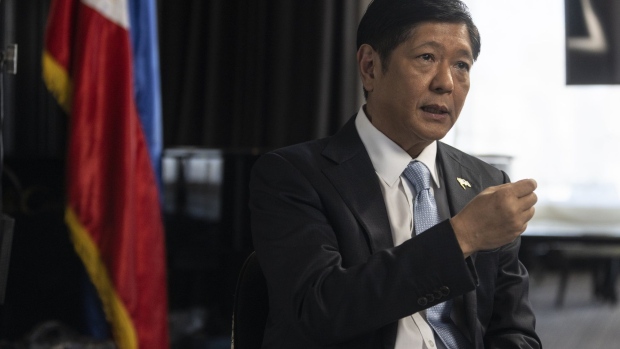Sep 23, 2022
Philippines Seeks Russian Fuel as Inflation Bites, Marcos Says
, Bloomberg News

(Bloomberg) -- The Philippines is talking to Russia about buying fuel and other key commodities because the country’s national interest overrides potential concerns over the war in Ukraine, President Ferdinand Marcos Jr. said in an interview with Bloomberg TV.
Noting that the Philippines can’t be complacent in relying on traditional suppliers, Marcos said the Southeast Asian nation was having conversations with Russia and other countries to diversify its supply chain for food stuffs and agricultural necessities like fertilizer to keep prices down.
“Now maybe we need to approach Russia, say that maybe they can loosen up and provide us with fuel,” Marcos said on Friday afternoon from New York, where he is attending the United Nations General Assembly. He added that the Philippines was “close” to striking agreements with Russia and others.
“The political side of it has been a little tricky, but nonetheless, the national interest comes first,” he said, when asked about US-led sanctions against Russia over its invasion of Ukraine. “We need to find those new sources of fuel. But that applies not only to fuel, it applies to things like feed, fertilizer, other inputs that are just critical for us.”
The comments come after a hectic week of global diplomacy in New York where US President Joe Biden and other G-7 leaders tried to gain more international momentum for a campaign to sanction and isolate Russia over its war in Ukraine. The comments from Marcos, who met with Biden this week, reflect the difficult choices facing leaders in many developing nations as rising prices drive people into poverty.
Marcos’s economic team is aiming for growth of at least 6.5% annually through 2028, bringing the country back to its pre-pandemic expansion levels. A broad reopening from what was among the world’s strictest pandemic lockdowns has supported economic recovery.
During his election campaign, Marcos Jr. was dogged by the human rights abuses and corruption during the 21-year rule of his father, who placed the nation under martial law 50 years ago. The president said his election indicates the nation has now “moved forward.”
“The last election has really given us the direction the people want us, the government, to take the Philippines and that is to economic prosperity,” Marcos said. “Best politics is still performance. And that’s how you move forward, you perform well.”
Inflation Surge
Still, the country is facing economic challenges, with the surge in commodities pushing inflation above target in a nation that imports goods from oil to wheat. That’s aggravated by the peso’s slump to a record low. The central bank has raised interest rates by 225 basis points so far this year to tame inflation.
Read more: Philippines Signals More Rate Hikes, FX Moves to Defend Peso
The nation has also experienced shortages in food items including sugar and onions. Marcos made the rare move of helming the agriculture department, as he seeks to deliver on his campaign pledge of food sufficiency.
Speaking before members of Asia Society in New York, Marcos said that despite the challenging environment “the Philippines remains on track to graduate to upper middle-income-country status by next year.”
“With steady investments in infrastructure, agriculture, food security, public health, education, and other social services, we seek to become a high-income country, with zero extreme poverty, by the year 2040,” he said.
(Adds Marcos’s comments in seventh, eighth paragraphs; his speech before Asia Society in final two)
©2022 Bloomberg L.P.






